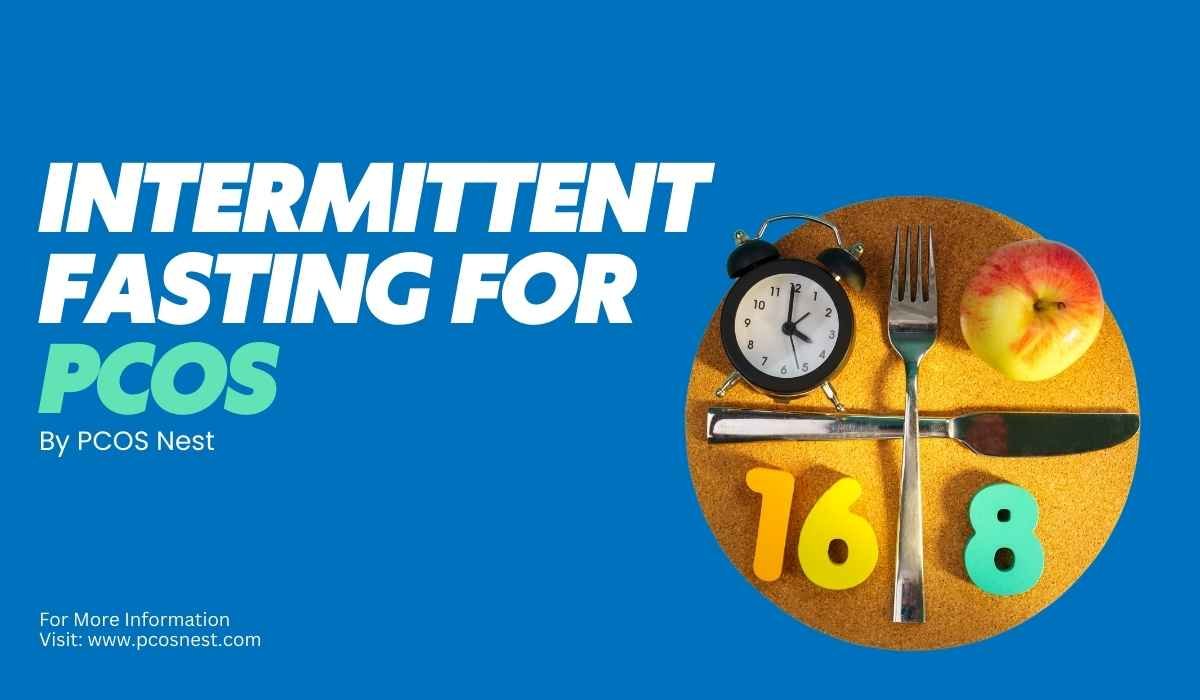Intermittent fasting (IF) is a simple eating plan where you cycle between periods of eating & fasting. It is helpful for women with PCOS and insulin resistance because it helps in lowering insulin levels and also improves insulin sensitivity (the body’s ability to use insulin effectively). This can reduce common PCOS symptoms like irregular periods and weight gain, especially around the belly.
Let’s study Intermittent Fasting For PCOS and Insulin Resistance.
How Intermittent Fasting Works:
Intermittent fasting works by giving our body a break from eating for a certain number of hours each day. During this time, instead of using the energy from food, our body starts using stored fat for energy. This helps to lower insulin levels. Lower insulin levels make it easier for the body to burn fat. By eating only during specific hours, like an 8-hour window, the body gets time to rest, reset & balance its hormones, which is especially helpful for handling PCOS and insulin resistance.

Common Methods of Intermittent Fasting:
The most common methods of intermittent fasting are:
1. 16:8 Method (Popular One):
In this method, you fast for 16 hours and eat during an 8-hour window. For example:
If you start eating at 12 PM, you stop eating at 8 PM and fast until 12 PM the next day.
During the fasting hours, you don’t eat anything, but you can drink water and black coffee.
2. 14:10 Method (Popular One):
This is similar to the 16:8 method but less strict. Fasting for 14 hours and eating within a 10-hour window. For example:
You can start eating at 10 AM and stop at 8 PM.
3. 5:2 Method:
In this method, eat normally for 5 days of the week and reduce the calorie intake on 2 non-consecutive days. For example:
On fasting days, eat about 500–600 calories (like a light soup, boiled eggs, or salad).
On the other 5 days, eat as usual, but not overeating.
4. Eat-Stop-Eat
This method involves fasting for a full 24 hours once or twice a week. For example:
Eat dinner at 7 PM and then don’t eat again until 7 PM the next day.
During the fasting period, we can drink water or black coffee but no solid food. It can be hard for beginners, so it’s better to try shorter fasts first.
5. ADF: Alternate-Day Fasting (Powerful One):
With this method, we alternate between eating normally and fasting every other day. On fasting days, we eat very few calories (about 500–600 calories) or nothing at all.
On eating days, eat your normal meals.
It’s a powerful method for weight loss, but it can be challenging for beginners.
6. Warrior Diet (Extreme One):
This is a more extreme method where we:
- Eat very small amounts of raw fruits and vegetables during the day (optional).
- Have one large meal at night within a 4-hour window (e.g., 6 PM to 10 PM).
The idea is to “fast” during the day and “feast” at night. It’s based on the eating habits of ancient warriors, but it might not be suitable for everyone, especially for beginners.
7. 12:12 Method (Easiest One):
This is the simplest method and great for beginners. Which Includes:
Fasting for 12 hours and eating during the remaining 12 hours.
For example, if we eat breakfast at 8 AM, we will stop eating after dinner at 8 PM.
This method is easy to follow because most of the fasting time is spent while we’re sleeping. It’s a good starting point to try intermittent fasting.
| Method | Who Should Try This? |
|---|---|
| 16:8 Method | Perfect for people who have a steady routine and can skip breakfast or dinner. |
| 14:10 Method | A great choice for beginners or those who find longer fasting hours challenging. If you want to ease into fasting gently and still get benefits like better energy and digestion, this method is for you. |
| 5:2 Method | Ideal for people who prefer flexibility and don’t want to fast every day. If you’re okay with eating fewer calories (500–600) just two days a week and eating normally the rest of the time, this is a good fit. |
| Eat-Stop-Eat | Best for people with experience in fasting who can handle not eating for 24 hours. If you want to burn fat quickly and don’t mind fasting once or twice a week, this could be your method. |
| Alternate-Day Fasting | Suitable for those highly motivated to lose weight and comfortable with fasting every other day. If you don’t mind cutting calories significantly on fasting days, this method can be effective—but it’s not ideal for beginners. |
| Warrior Diet | Designed for people who prefer eating one large meal at night and don’t mind light snacking during the day. If you like structured diets and can manage hunger well, this could work for you. Beginner should not try this. |
| 12:12 Method | The best starting point for anyone new to fasting. It’s super easy because most of the fasting happens while your sleeping time. |
Also Read: How to Get Rid Of PCOS Belly?
Benefits of Intermittent Fasting (Backed by Research):
1. Helps with Weight Loss & Insulin Sensitivity:
Intermittent fasting helps the body to burn fat by lowering insulin levels and increasing fat-burning hormones like norepinephrine. This process is called metabolic switching, which helps our body to use stored fat for energy. IF can reduce body weight by 3–8% after 3–24 weeks and also improves Insulin Sensitivity.
The intermittent fasting lowers blood sugar levels. Research indicates that IF can decrease fasting insulin levels by up to 31%. (Reference: Journal of Translational Medicine, 2015 and Obesity Research & Clinical Practice, 2018).
2. Supports Heart Health:
Intermittent fasting can lower several risk factors for heart disease, including blood pressure, cholesterol, triglycerides, and inflammation. IF can improve heart health by reducing these risk factors. (Reference: The American Journal of Clinical Nutrition, 2015).

3. Reduces Inflammation:
Chronic inflammation is linked to many health problems like PCOS, arthritis, and heart disease. Intermittent fasting can lower inflammation in the body. This is important for improving overall health and also reduces the risk of long-term illnesses. (Reference: Journal of Clinical Endocrinology & Metabolism, 2017).
4. Boosts Brain Health:
Intermittent fasting also has benefits for brain health. Fasting helps in the production of brain-derived neurotrophic factor (BDNF), a protein that supports the growth and repair of brain cells. IF also helps in protecting against neurodegenerative diseases like Alzheimer’s and Parkinson’s disease. (Reference: Cell Metabolism, 2014).
Tips for PCOS-Friendly Fasting:
Start with shorter fasting periods, like 12:12, and gradually increase to 16:8 or 14:10.
Break your fast with a balanced meal like
- Protein: Eggs, fish, or lentils.
- Healthy Fats: Avocado, nuts, or olive oil.
- Fiber: Leafy greens, quinoa, or whole fruits.
Drink plenty of water throughout the day. Herbal teas like spearmint tea are good for hormonal balance.
Also do little exercises like walking, yoga, or Pilates to complement fasting benefits.
Who Should Avoid Intermittent Fasting?
Although intermittent fasting (IF) offers several health benefits, it’s not suitable for everyone. Following one should avoid intermittent fasting.
1. Pregnant and Breastfeeding Women
2. People with Eating Disorders like anorexia, bulimia, or binge eating.
3. People Underweight or with Nutrient Deficiencies
4. People with Medical Conditions like type 1 diabetes, Hypoglycemia (Low Blood Sugar) & Chronic Health Conditions like heart disease, liver problems, or kidney issues.
5. Those taking certain medications, such as some medications, require consistent food intake for proper absorption or to prevent side effects.
6. Children or teenagers under 18.
Caution☠:
In some cases fasting can also cause irregular periods, if you experience this then reduce the fasting window or stop temporarily. IF may cause irregular periods if not done properly, especially in those underweight or with a caloric deficit. So while fasting make sure you’re getting enough nutrients. And do not opt for extreme fasting methods without consulting with your doctor. Because each person’s situation is unique, the thing that is suitable for one cannot be ideal for another person. So physical checkup is necessary, especially in conditions like PCOS.

